Back in the late 1980s Rod Campbell’s lift-the-flap picture book Oh Dear! was a bedtime staple for my eldest daughter. Swing forward 14 years to the early 2000s and we revisited Buster’s search for eggs during his stay at Grandma’s farm as part of the youngest daughter’s bedtime routine.
I’m not suggesting that the book hadn’t dated a wee bit, but the flaps still had to be lifted until the eggs were found under the tractor (just kidding). There was no early exit from that journey of discovery. No way.
Most of us will have books or shows that we read or watched repeatedly at some point in our lives. People my age will no doubt feel slightly uncomfortable about some of those old favourites in the light of the enlightenment of age and education. And, of course, understanding/learning rightly makes us reevaluate some of those tomes we devoured with unmitigated relish when we were young.
For example, I don’t think I could go back to Margaret Mitchell’s Gone with the Wind. I first read it on a school exchange trip to Saint-Etienne in France. I was 13, raging with hormones and incomprehensible and directionless lust and longing. And that book was pure gold to me. A heaven of escapism. The absolute antidote to the sour welcome of my French copine.
With that book, the lonely hours spent in my chambre flew by. In fact, having to go out and stumble through a few French sentences was a bit of a chore by comparison. What cracking storytelling. I can’t tell you how many times I read that book over the next few years. I’m sorry to say that I don’t think the novel’s overt pro-slavery stance occurred to me for a moment and, maybe, even when it did, I ignored it because I loved the story so much. But now… well, no more blind eyes.
Before Gone with the Wind I endlessly re-read Johanna Spyri’s Heidi. There’s that moment when Peter’s jealousy drives him to commit what seemed to a seven-year-old the most awful crime1. I can still feel the tension and horror nearly 60 years on. And the simplicity and beauty of life in the Swiss mountains! Ah… wasn’t that the thing we all hankered after? Until we didn’t. I would flick on a small torchlight after ‘lights out’ and continue reading my precious (Tolkien’s Lord of the Rings, another obsessional re-read) Heidi into the early hours. Then, one fateful night, the door burst open at 3am and my furious mother boxed my ears and confiscated Heidi and the goats and Klara and Peter and the mountains. How I cried for them all. I mean, I’m sure Mum gave the book back but I probably never felt quite the same about it after that.
How miraculously such stories enter our psyche and enrapture our imaginations! How we long to spend time with the characters and enter their worlds. How we wonder (and worry) about what they will do next and what will happen to them (the What Katy Did series by Susan Coolidge = another fave). What is it about such books that so fires us up?
Here are a few thoughts:
It’s a cracking story that peaks and plateaus without us noticing the craft of it. We live it in our page turning.
It’s characters that are larger than life but rooted in truth. We might rail against their decisions, but we know that we too are capable of the emotions that incite them.
It’s an authentic narrative voice that inconspicuously holds us in the story’s world, drawing us on and on through the action.
It’s the surprise, shock and/or delight we experience in the imagined world - despite the fact that there is ‘nothing new under the sun’.
What books have you revisited time and again and why? What makes them so compelling to you? I’d love to know.
All of this is a long-winded way of acknowledging that, whilst I’m in the thick of rehearsing and preparing for the tour of Previously Loved (we open at Alnwick Playhouse in less than a fornight - eek!), I can’t write. My brain is mush. I am going through the actions of day-to-day life but I’m not sure I actually exist at the moment. Is it possible to want these interim days to go on forever and to be over quickly simultaneously? Let me tell you: it is.
I have now turned my script into a giant lift-the-flap book in a last ditch attempt to learn my lines. How is it possible to remember words read some 60 years ago but not those read repeatedly yesterday?
Till next time
I’ll leave you with a few rehearsal photos of Previously Loved. It’s all going terribly well. We’re sold out for the Berwick and Etal shows but a few tickets are still available at Alnwick (see link above) and at Chatton.
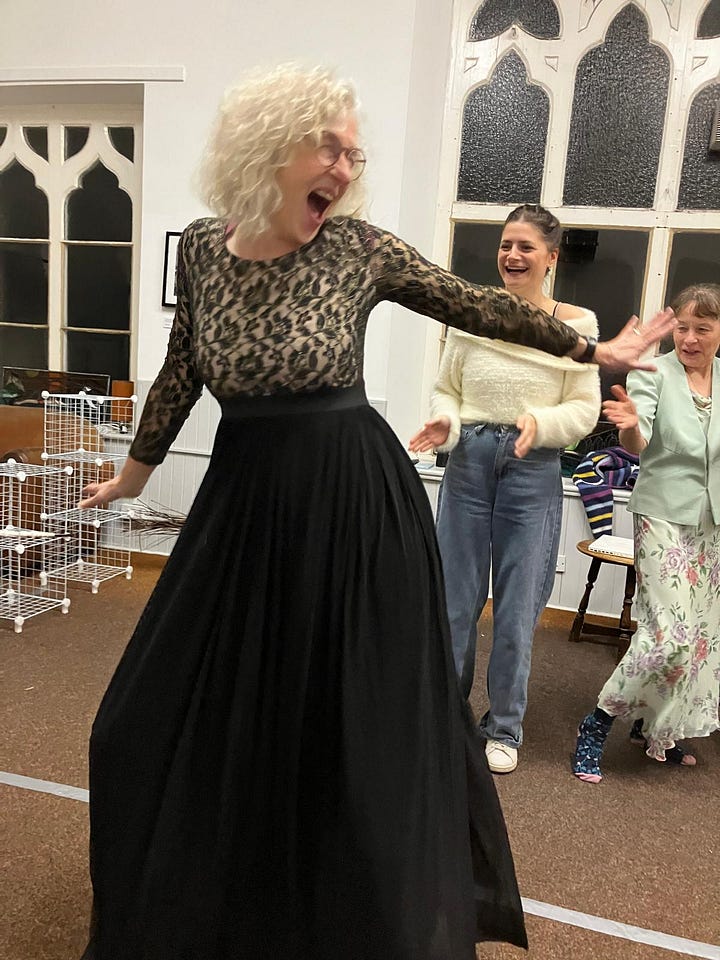
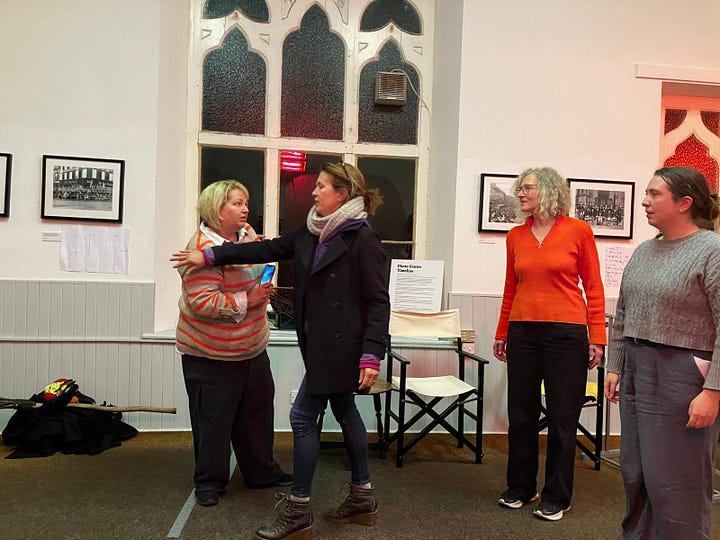
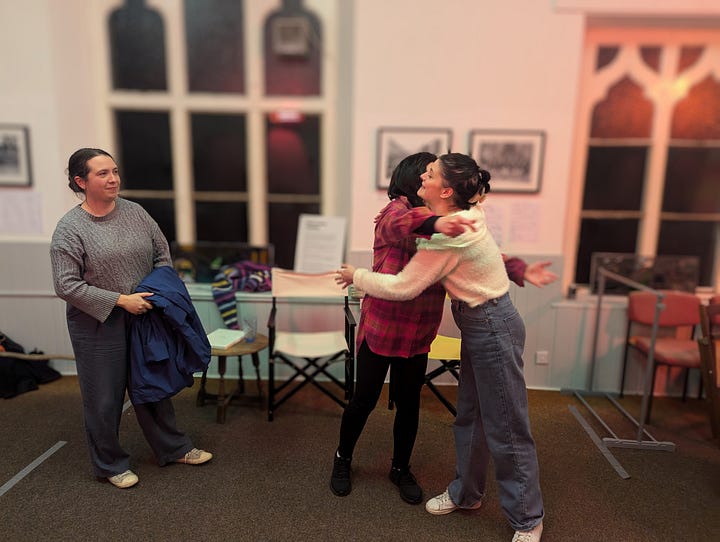
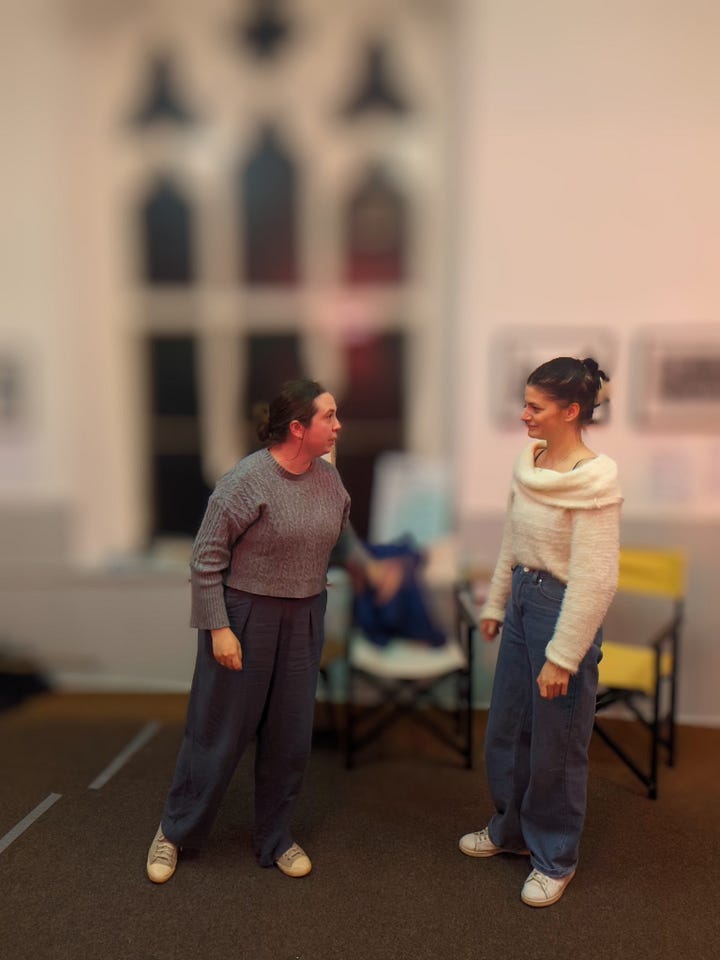
For those (like The Husband) who don’t know the crime committed by Peter, here it is: Peter, so jealous of Heidi’s friendship with dear, benevolent Klara (who visits the mountain idyll from the big city to take the mountain air), pushes Klara’s rickety wheelchair over the cliff (she’s not in it - we’re not not in What Ever Happened to Baby Jane territory here!), making it look like an accident. Eventually, Peter’s crime has positive outcomes (of course) as Klara learns to walk again.





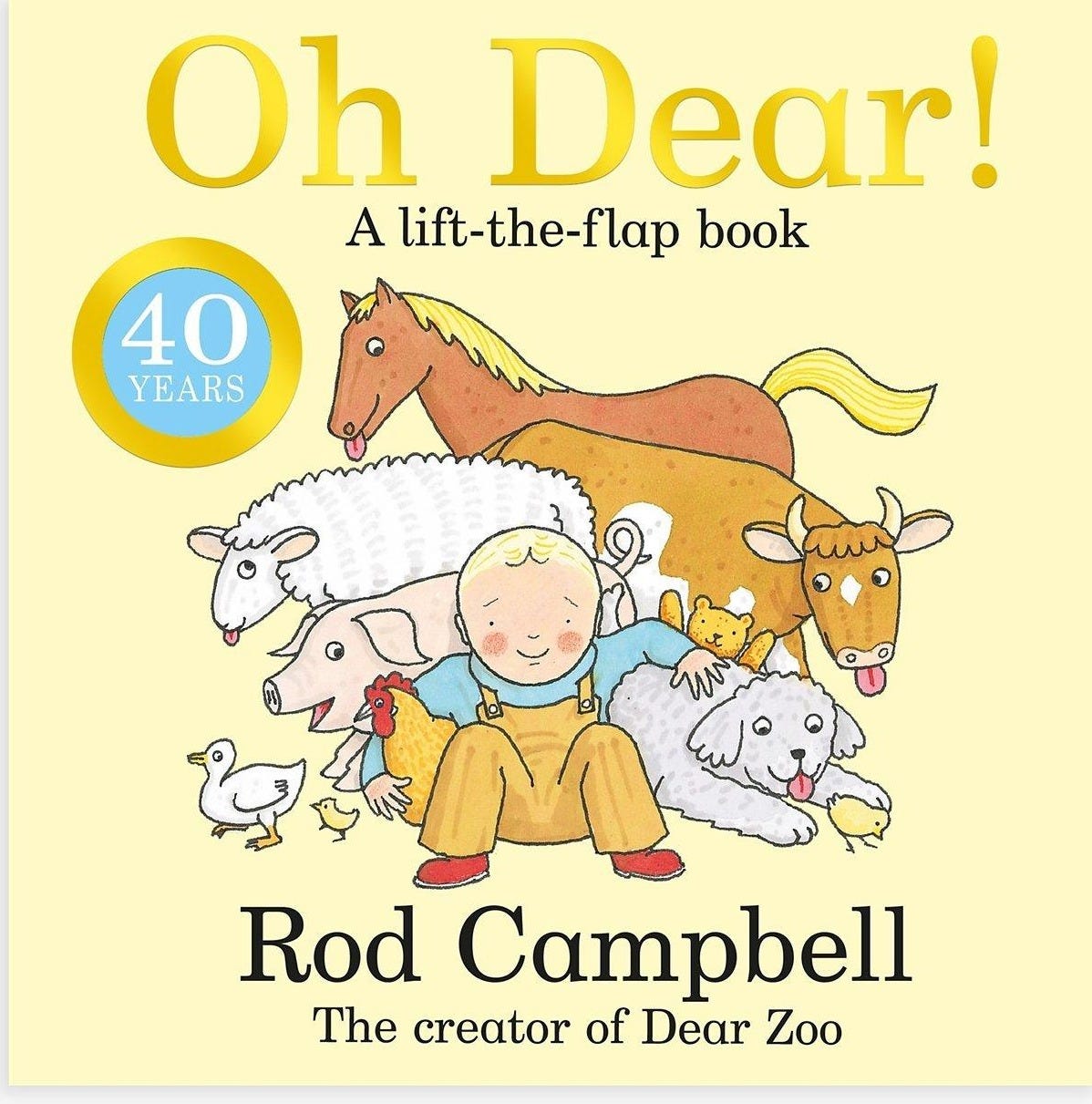
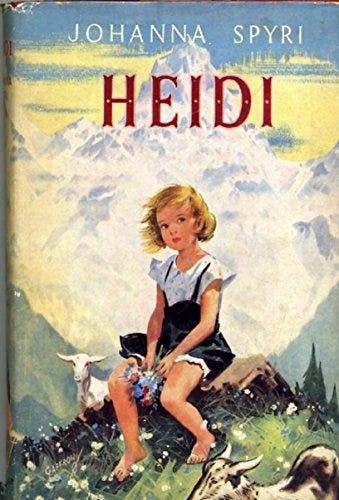

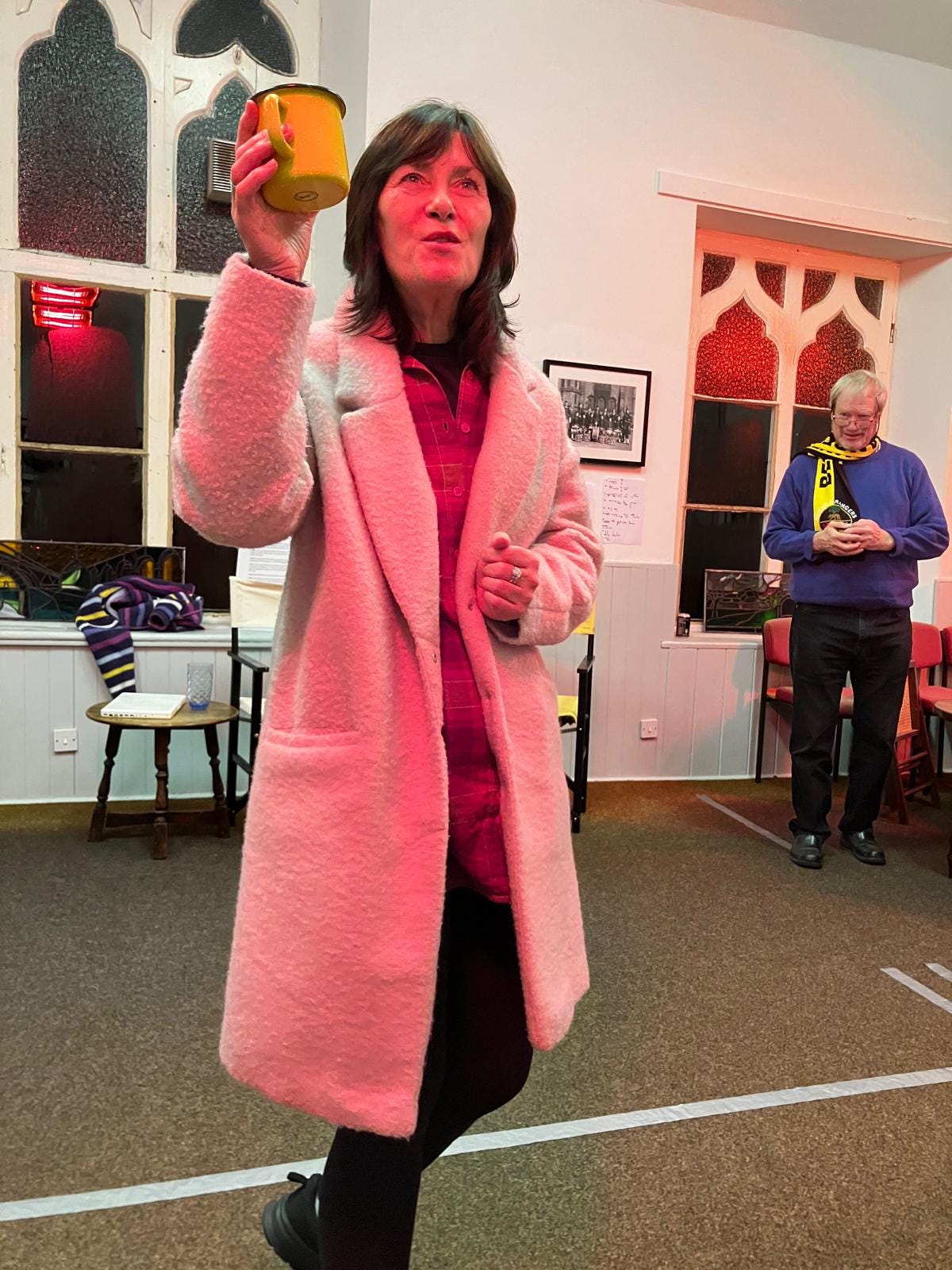
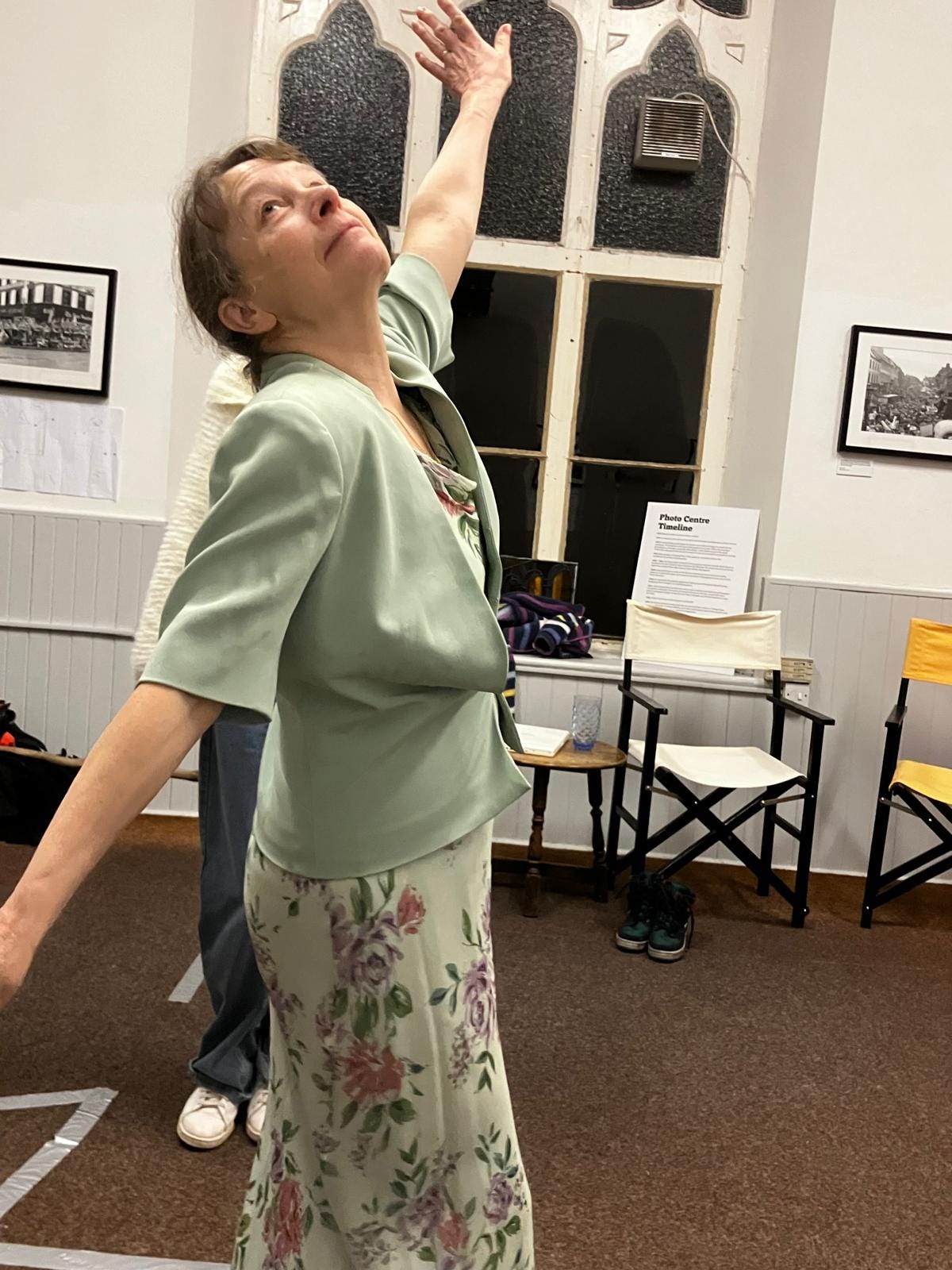
Hmmm - Gone With The Wind. Badly written and over-long, a tedious story which boils down to Girl meets Boy, Girl intensely dislikes Boy, Girl and Boy get married, Boy commits marital rape but Girl enjoys it so that’s all right then, Girl loses Boy but vows to get him back. With added glorification of slavery, being on the wrong side in a Civil War (not that there’s really a right side) and the Ku Klux Klan. You’ll probably gather I’m not a fan.
Heidi - how exactly did Clara gain the ability to walk? As I recall it was something to do with wanting to and trying really hard. I think the Tory Government took a similar approach to disability benefit claimants.
What Katy Did - didn’t two of the younger children spend a day at a house called Conic Section? That was just weird - I don’t remember any comic play on words anywhere else in the book so what was that all about?
Was Cousin Helen just put in there to make the rest of us feel bad about ourselves?
And how did Katy regain her ability to walk? This seems even more miraculous than Clara’s similar experience in Heidi. It’s interesting that in Jacqueline Wilson’s updated version of What Katy Did, Katy adjusts to life in a wheelchair. Yes - I have read it. No - I have no idea what possessed me.
Having an older sister I was introduced to Enid Blyton’s Malory Towers and St Claire’s series and soon knew more than I needed to about girls’ boarding schools. Who could forget Gwendoline Mary Lacey, the spoiled snob of Malory Towers, whose come-uppance was delivered when her father became seriously ill. As a result she was forced to leave Malory Towers in her final term and to take an office job instead of going to the Swiss finishing school she constantly boasted about. The last we hear of her is via a letter to her erstwhile nemesis Darrell Rivers, which reveals her to have become a much nicer person. Who knew office work could be so character-building?
Rereading these books as an adult I was struck by their similarly to the TV series Prisoner: Cell Block H - Form Captain/Top Dog, good and bad girls, kind and malevolent authority figures, wise Headmistress/Governor, midnight feasts/illicit hooch brewing. Not forgetting the lesbian stereotypes - Enid played a blinder sneaking those in.
Later my brother introduced me to the Chronicles of Narnia. Although I’ve reread them several times the only ones I can stomach nowadays are The Lion, The Witch and The Wardrobe and The Magician’s Nephew. The Last Battle would have made the cut were it not for the implication that Susan Pevensey would ultimately go to Hell.
I really don’t understand why people accuse me of overthinking.
The best thing about having a child was being able to re-read a host of stories that I loved myself (although always a bit disappointing if they weren't loved quite so well by my daughter!) I had a bit of a thing for stories with slightly moody young heroines being thrust into exciting situations, like Mary Lennox in The Secret Garden (which novel may also be at the root of my love of gardens and gardening) or Maria Merryweather in The Little White Horse. And, of course, my love of Brambly Hedge remains strong to this day... who doesn't want to visit the Store Stump, or go to the wedding of Poppy and Dusty?